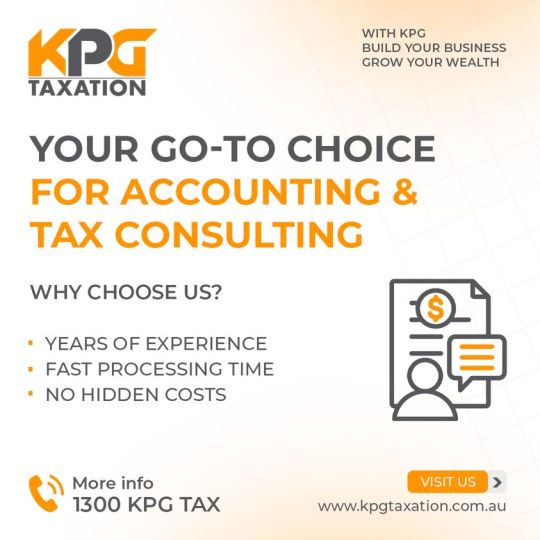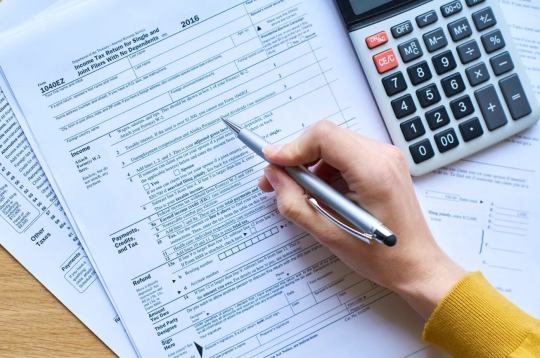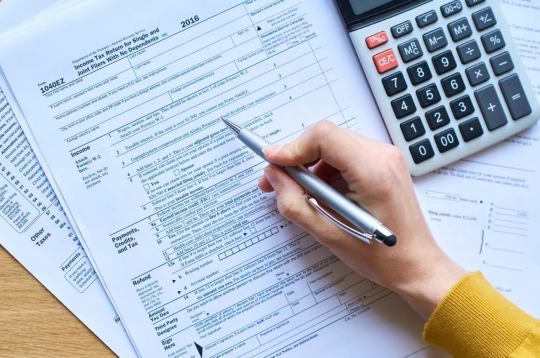#Tax return
Text
We have lovingly, painstakingly updated our tax filing how-to guide for the 2023 tax year. So if you haven't filed your tax return yet, here's everything you need to know... including the due date, which is a month away.
Get after it, my lovelies!

#personal finance#adulting#finance#saving money#taxes#tax return#how to file your taxes#2024 tax season#2023 taxes
335 notes
·
View notes
Text
Legitimately crying at having to pay back $800 in taxes for health insurance. I only had 2 jobs and could barely afford to pay for my health insurance each month, and now I have more to pay?🥹
6 notes
·
View notes
Text
The Most Important Information to Give the IRS to Settle Your IRS Tax Debts
If you Owe Back Taxes, if you are suffering from an Economic Hardship and if can’t pay your Monthly Living Expenses, you May be in Luck!☘️
When you owe back taxes to the IRS, May suddenly become very interested in your monthly income and expenses!
In fact you may want the IRS to know about your personal financial situation!
You may want to share your monthly expenses, such as your;
• Housing costs
• Car payment, gas, and insurance
• Gas, water, electric and other utility bills
• Medical insurance
• Cell phone
• Groceries and dining out
…and much more.
Why would you share this information with the IRS?
It all comes down to what the IRS calls Allowable Living Expenses.
The second you become a tax debtor, the IRS has a Secret tax lien against everything you own, including your future income. This is a feature of federal law, and it’s the basis for all the other collection actions that the IRS can take against you, such as a Wage Garnishment or Bank Levy.
Because of the lien, the IRS legally has a say in how you spend your money. Nobody likes this, but it’s the reality of how the US tax code works.
As with most laws, there is a long and complicated list of rules that go into determining what place the IRS holds in line behind or ahead of your other creditors, but the bottom line is that the IRS wants to get paid, and they have power to make your life a living nightmare by enforcing the tax laws over your money and assets.
It’s not all bad, however. There are specific legal protections that exist to prevent the IRS from taking everything you own. In simple terms, the IRS is not allowed to make you destitute. In other words, they are not allowed to put your family out on the street or force your children to starve if it creates an Financial Hardship on you and your family.
This is where those Allowable Living Expenses (ALE) come in. The IRS must allow you to pay all your basic living expenses, even if it means you cannot pay the IRS what you owe them. Sounds Great! Mostly, other than the tax lien they may file.
The IRS has legal standards that is required to follow and allow you and your family to pay before the IRS can collect anything. These are the usual categories:
• Food, clothing, personal care products, and “miscellaneous”
• Out of pocket health care costs
• Vehicle ownership and operating costs
• Rent or mortgage
• Utilities, including gas, water, electric, cell phone, Internet, and more
For vehicle operating costs, housing, and utilities, they do take into account regional variations for these costs. The rest are all based on national numbers. All the numbers also have adjustments based on family size.
These numbers “dictate” what the IRS will allow you to spend every month to live. Your income, when compared to these allowable standards, is what determines which IRS tax relief options you may be eligible for.
If your income is less than the total monthly allowable living expenses for Honolulu or where you live and family size, you might be eligible for a program that allows you to pay the IRS nothing. Yes, nothing. Zero. Nada. Zilch.
If your income is also less than the total monthly allowable living expenses, the IRS calculate for you, but you have assets – such as lots of equity in your home, stocks, bonds, classic cars, crypto, or the world’s most valuable Vinyl Record collection – then they’re going to take into consideration the value of those assets, too. But, in such a situation, you may be able to settle your tax debt for less than what you owe, and walk away from the rest.
If your income is more than the allowable living expense calculation, then the IRS is going to take that “excess” income into consideration for a reduced settlement. If you’re not eligible for a reduced settlement – which most people are not – then this “excess” income becomes the monthly minimal payment the IRS can require as a monthly payment.
One of the first things that Tax Relief Services can help our clients when they hire us to help them with a tax debt problem is to conduct a detailed Preliminary Analysis the exact same detailed financial analysis that the IRS should do but most of the time will not. We do the Preliminary Analysis for a number of reasons, such as:
1. Determining which IRS programs you’re eligible for.
2. Seek opportunities to legally increase your allowable living expenses.
3. Determine if the IRS balances are correct.
4. Look for unique circumstances that might open doors to outside-the-box resolution options.
This preliminary financial analysis is crucial for us to be able to get the best possible deal for our clients. Since the vast majority of tax debtors will end up on a monthly payment plan to the IRS, our job is to help get you the smallest possible monthly payment and help you minimize the short-term financial impact on your budget.
The IRS is NOT LOOKING OUR FOR YOU, BUT TAX RELIEF SERVICES IS!
If you’re in a situation where the IRS is hounding your, then we should chat. You don’t want to wind up in a situation where the IRS simply pigeon-holes you into the situation that is most convenient for them, leaving you unable to pay other monthly bills. Just schedule a time to chat:
WWW.TAXRELIEFSERVICES.COM
CALL TODAY!
TAX PROBLEMS DON’T GO AWAY!
808.589.232
#accounting#tax relief#taxreduction#tax#personal debt#tax expert#tax help#taxprofessional#tax reprieve#taxpayers#irs#financial#taxes#business#tax return#tax preparation
5 notes
·
View notes
Text

Tax Return Accountant in Melbourne - Accounts Nextgen
At Accounts Nextgen, our dedicated team of Tax Return Accountants In Melbourne is committed to optimizing your financial outcomes. With in-depth knowledge of Australian tax laws and a focus on personalized service, we work tirelessly to maximize your returns while ensuring compliance. Trust us to navigate the complexities of tax returns with precision and efficiency, empowering you to achieve your financial goals confidently.
#Tax Return#Tax Return Accountant#Tax Return Accountant in Melbourne#Accounts Nextgen#accounting training#tax accountant programs#tax return melbourne#australia#loans#finance
0 notes
Text
0 notes
Text
Find Your Perfect Tax Return Accountant & Specialist

Feeling lost in tax season? Don't stress! KPG Taxation is your one-stop shop for reliable tax return services in Springvale. Our tax accountant Springvale ensure your tax return is accurate and optimised, maximising your refund or minimising your tax liability. Let our experts handle the complexities of Australian tax law so you can focus on what matters most. Contact us today!
0 notes
Text
Screw Up Your Taxes? Here’s How To Get Out of Paying Tax Penalties
For anyone who has ever fucked up their taxes and received a hefty fine, there is a little known and seldom used get-out-of-jail-free card (and by “jail” we mean “penalty fees”).
It’s not complicated, it’s easy to obtain, and anyone who pays taxes can use it. Yet since this lovely loophole was established in 2001, it’s been used relatively infrequently. This is because, according to a report by the Treasury Inspector General for Tax Administration (TIGTA), most tax payers and tax preparation professionals don’t even know it exists
Here's what you need to know.
If you found this helpful, consider joining our Patreon
84 notes
·
View notes
Text
Case Study: HMRC Enquiry Notice Deemed Out of Time
In the recent case of Richard Monks v HMRC [2023] UKFTT 853 (TC), the First-tier Tribunal (FTT) made a significant ruling regarding the validity of HMRC’s enquiry into the taxpayer’s tax returns. This article explores the background of the case, the FTT decision, and the implications it holds for taxpayers facing similar circumstances.
HMRC TAX DISPUTES LEGAL ADVICE & DEFENCEOur lawyers have a…

View On WordPress
#Advice for Taxpayers#Appeals#enquiry notice#First Tier Tax Tribunal#HMRC#HMRC assessment#HMRC Tax Assessment#HMRC Tax Disputes#Self Assessment Tax Return#tax return
0 notes
Text
Strategies For Optimizing Corporate Tax Return Preparation

Corporate tax return preparation can be a daunting task for businesses, but with strategic planning and execution, it can also be an opportunity to maximize tax efficiency and minimize liabilities. By implementing the right strategies, businesses can streamline the tax return preparation process, ensure compliance with regulations, and potentially uncover valuable tax-saving opportunities. Let's explore some key strategies for optimizing corporate tax return preparation.
1. Start Early and Stay Organized
Procrastination can lead to rushed and error-prone tax return preparation. To avoid last-minute stress and ensure accuracy, start the tax return preparation process early. Create a timeline with clear milestones and deadlines, allowing ample time for gathering documents, reconciling accounts, and completing necessary forms. Cloud-based accounting software can streamline document management and facilitate collaboration among team members involved in the tax return preparation process.
2. Know Your Deadlines
Understanding tax return filing deadlines is crucial for avoiding penalties and interest charges. Corporate tax return deadlines vary depending on the business structure and fiscal year-end. For calendar-year corporations, the deadline for filing IRS Form 1120 is typically March 15th, while fiscal-year corporations may have different deadlines. Stay informed about filing deadlines for federal, state, and local tax authorities, and plan accordingly to ensure timely submission of tax returns. Consider setting reminders or using tax compliance software to track deadlines and avoid missed filings.
3. Maximize Deductions and Credits
Identifying eligible deductions and credits is key to reducing taxable income and minimizing tax liabilities. Common deductible expenses include operating expenses, depreciation, employee benefits, and charitable contributions. Additionally, explore tax credits available for research and development, energy efficiency, employee hiring, and other qualifying activities. Consult with a tax advisor offering service of corporate tax return preparation in Mayfield Heights OH to ensure that you're maximizing available deductions and credits while maintaining compliance with tax laws and regulations.
4. Leverage Technology Solutions
Technology can play a significant role in optimizing corporate tax return preparation processes. Invest in tax preparation software or cloud-based accounting platforms that offer features such as automated data entry, reconciliation, and tax form generation. These tools can streamline repetitive tasks, reduce manual errors, and improve overall efficiency.
5. Review and Reconcile Financial Records
Thoroughly review and reconcile financial records to ensure accuracy and completeness before preparing your corporate tax return. Conduct a comprehensive analysis of income statements, balance sheets, and cash flow statements to identify discrepancies or anomalies that may require further investigation. Reconcile bank accounts, credit card statements, and other financial accounts to verify transactional data and ensure that all income and expenses are properly recorded.
6. Stay Abreast of Tax Law Changes
Tax laws and regulations are subject to frequent changes, which can have significant implications for corporate tax return preparation. Stay informed about recent developments in tax legislation, rulings, and interpretations that may impact your business. Subscribe to tax news updates, attend seminars or webinars, and consult with tax professionals to stay abreast of changes and assess their potential impact on your tax return preparation strategy. By staying proactive and informed, you can adapt your tax planning and preparation efforts to align with evolving regulatory requirements and maximize tax-saving opportunities.
Conclusion
Optimizing corporate tax return preparation requires careful planning, attention to detail, and proactive management. By starting early, staying organized, knowing your deadlines, maximizing deductions and credits, leveraging technology solutions, reviewing financial records, and staying abreast of tax law changes, businesses can streamline the tax return preparation process, ensure compliance with regulations, and potentially uncover valuable tax-saving opportunities.
0 notes
Text
Navigating Tax return: A Comprehensive Guide

Tax season can be a daunting time for many individuals and businesses alike. With laws and regulations constantly evolving, it's essential to stay informed and prepared when it comes to filing your tax return. For residents and businesses on the Gold Coast, understanding the specific nuances of tax requirements in this region is crucial for compliance and maximizing returns. In this comprehensive guide, we'll explore everything you need to know about navigating tax return.
Understanding Gold Coast Tax Regulations:
Before diving into the specifics of filing your tax return, it's essential to understand the unique tax regulations that apply to the Gold Coast. Like the rest of Australia, the Gold Coast operates under the Australian Taxation Office (ATO). However, certain factors, such as regional tax incentives and deductions, may vary.
For individuals, common tax considerations include income tax, capital gains tax (CGT), and goods and services tax (GST). Additionally, residents of the Gold Coast may be eligible for specific deductions related to expenses incurred in the region, such as travel expenses for work-related activities.
For businesses operating on the Gold Coast, tax obligations extend beyond income tax to include payroll tax, fringe benefits tax (FBT), and various industry-specific taxes. Understanding these obligations and leveraging available incentives can significantly impact your bottom line.
Preparing Your Tax Return:
Preparation is key when it comes to filing your tax return Gold Coast. Whether you're an individual or a business entity, gathering relevant documentation and staying organized throughout the year can streamline the process and minimize potential errors.
For individuals, key documents include PAYG summaries, bank statements, receipts for deductible expenses, and any investment-related documents. Keeping digital copies of these documents can make it easier to access and reference them when needed.
For businesses, maintaining accurate financial records is essential. This includes income statements, expense reports, payroll records, and details of any assets or investments. Utilizing accounting software or hiring a professional accountant can help ensure compliance and accuracy.
Maximizing Deductions and Tax Credits:
One of the primary goals when filing a tax return is to maximize deductions and tax credits to minimize your tax liability. On the Gold Coast, there may be specific deductions and incentives available to individuals and businesses.
For individuals, common deductions include work-related expenses, charitable donations, and investment-related expenses. Additionally, residents of the Gold Coast may be eligible for deductions related to property ownership, such as mortgage interest and maintenance costs.
For businesses, deductions can vary depending on the industry and nature of operations. Common deductions include wages, rent, utilities, and depreciation of assets. Additionally, businesses may be eligible for tax credits for research and development activities or employing apprentices.
Seeking Professional Advice:
Navigating the complexities of tax return can be challenging, especially for individuals and businesses with unique circumstances. Seeking professional advice from a qualified accountant or tax advisor can provide invaluable assistance.
An experienced advisor can help you identify potential deductions, ensure compliance with regulations, and optimize your tax strategy to achieve the best possible outcome. Additionally, they can provide guidance on long-term tax planning and help you stay abreast of any changes in tax laws that may affect you.
Filing your tax return doesn't have to be a daunting task. By understanding the specific regulations, preparing diligently, and leveraging available deductions and incentives, you can navigate the process with confidence. Whether you're an individual or a business entity, seeking professional advice can help ensure compliance and maximize your returns. With careful planning and attention to detail, you can navigate tax season on the Gold Coast smoothly and efficiently.
0 notes
Text
Navigating Tax return: A Comprehensive Guide

Tax season can be a daunting time for many individuals and businesses alike. With laws and regulations constantly evolving, it's essential to stay informed and prepared when it comes to filing your tax return. For residents and businesses on the Gold Coast, understanding the specific nuances of tax requirements in this region is crucial for compliance and maximizing returns. In this comprehensive guide, we'll explore everything you need to know about navigating tax return.
Understanding Gold Coast Tax Regulations:
Before diving into the specifics of filing your tax return, it's essential to understand the unique tax regulations that apply to the Gold Coast. Like the rest of Australia, the Gold Coast operates under the Australian Taxation Office (ATO). However, certain factors, such as regional tax incentives and deductions, may vary.
For individuals, common tax considerations include income tax, capital gains tax (CGT), and goods and services tax (GST). Additionally, residents of the Gold Coast may be eligible for specific deductions related to expenses incurred in the region, such as travel expenses for work-related activities.
For businesses operating on the Gold Coast, tax obligations extend beyond income tax to include payroll tax, fringe benefits tax (FBT), and various industry-specific taxes. Understanding these obligations and leveraging available incentives can significantly impact your bottom line.
Preparing Your Tax Return:
Preparation is key when it comes to filing your tax return Gold Coast. Whether you're an individual or a business entity, gathering relevant documentation and staying organized throughout the year can streamline the process and minimize potential errors.
For individuals, key documents include PAYG summaries, bank statements, receipts for deductible expenses, and any investment-related documents. Keeping digital copies of these documents can make it easier to access and reference them when needed.
For businesses, maintaining accurate financial records is essential. This includes income statements, expense reports, payroll records, and details of any assets or investments. Utilizing accounting software or hiring a professional accountant can help ensure compliance and accuracy.
Maximizing Deductions and Tax Credits:
One of the primary goals when filing a tax return is to maximize deductions and tax credits to minimize your tax liability. On the Gold Coast, there may be specific deductions and incentives available to individuals and businesses.
For individuals, common deductions include work-related expenses, charitable donations, and investment-related expenses. Additionally, residents of the Gold Coast may be eligible for deductions related to property ownership, such as mortgage interest and maintenance costs.
For businesses, deductions can vary depending on the industry and nature of operations. Common deductions include wages, rent, utilities, and depreciation of assets. Additionally, businesses may be eligible for tax credits for research and development activities or employing apprentices.
Seeking Professional Advice:
Navigating the complexities of tax return can be challenging, especially for individuals and businesses with unique circumstances. Seeking professional advice from a qualified accountant or tax advisor can provide invaluable assistance.
An experienced advisor can help you identify potential deductions, ensure compliance with regulations, and optimize your tax strategy to achieve the best possible outcome. Additionally, they can provide guidance on long-term tax planning and help you stay abreast of any changes in tax laws that may affect you.
Filing your tax return doesn't have to be a daunting task. By understanding the specific regulations, preparing diligently, and leveraging available deductions and incentives, you can navigate the process with confidence. Whether you're an individual or a business entity, seeking professional advice can help ensure compliance and maximize your returns. With careful planning and attention to detail, you can navigate tax season on the Gold Coast smoothly and efficiently.
0 notes
Text
Tax Return: Expert Strategies for Financial Growth
Discover expert strategies for financial growth with our comprehensive Tax Return Services. Our team of professionals is dedicated to maximizing your tax refund while ensuring meticulous accuracy. With a focus on personalized service and thorough knowledge of tax laws, we provide peace of mind during tax season. Let us help you achieve your financial goals and secure a prosperous future.

0 notes
Text
What Documents Must I Prepare Before Meeting With a Tax Accountant in Parramatta?
Tax season is just around the corner, and it's time to get your financial ducks in a row! Preparing the proper documents can make your visit smooth and stress-free if you plan to meet with a Tax Accountant in Parramatta.

In this blog post, we'll break down the essential documents you should gather before your meeting, ensuring that you and your tax accountant can tackle your taxes efficiently.
Let's understand more about the topic:
Identification Documents:
Ensure you carry valid identification documents, such as your driver's license, passport, or government-issued ID. This helps your tax accountant verify your identity and ensure accurate tax return information.
Tax File Number (TFN) or Social Security Number (SSN):
Have your Social Security Number (for U.S. residents) or Tax File Number (for Australian residents) handy. This is a crucial piece of information needed for tax filing, and having it ready will save time during your meeting.
Also Read - From Deductions to Returns: Your Ultimate Guide to Tax Accountants in Parramatta
Income Documents:
Collect all sources of income documents, including W-2 forms (for employees), 1099 forms (for freelancers or contractors), and statements of any additional income such as rental income or dividends. These documents provide a snapshot of your total earnings.
Expense Records:
Keep records of deductible expenses like medical bills, education expenses, business expenses, and receipts for charitable donations. Providing detailed documentation of your expenses helps your tax accountant identify potential deductions.
Bank Statements and Financial Records:
Bring along your bank statements, investment statements, and any other financial records that may be relevant. These documents give your tax accountant a comprehensive view of your financial situation.
Property and Asset Information:
If you own property or other significant assets, gather relevant documents like mortgage statements, property tax records, and details about substantial purchases or sales during the tax year.
Health Insurance Information:
Ensure you have information about your health insurance coverage, including plan details and any payments made. This is important as it may affect your tax liability or credit eligibility.
Previous Tax Returns:
If you've worked with a tax accountant in the past, bring copies of your previous tax returns. They can provide valuable insights and help identify any recurring patterns in your financial history.
Conclusion
Preparing these essential documents before meeting with a Parramatta Tax Accountants sets the stage for a productive and efficient discussion. Remember, the more organised you are, the smoother the tax preparation process. Take the time to gather these documents, and you'll be well on your way to a stress-free tax season!
Prepare for tax success! Before meeting your Tax Accountant in Parramatta, gather essential documents for a seamless experience. For top-notch tax services, choose the Best Tax Accountant near you at Tax Purpose. Maximize returns with Parramatta's finest Tax Agents.
1 note
·
View note
Text
0 notes
Text
What Happens if My Tax Return is Audited?
Filing your tax return is an annual responsibility, and for most individuals, it's a relatively straightforward process. However, there's always the possibility that your tax return could be selected for an audit. While the idea of an audit may evoke anxiety, understanding the process can help alleviate concerns and ensure a smoother experience. In this article, we'll delve into the key aspects of what happens if your tax return is audited.

Understanding the Audit Process:Before delving into the specifics of what happens during an audit, it's crucial to comprehend the audit process itself. An audit is essentially an examination of your tax return to verify its accuracy and completeness. The Internal Revenue Service (IRS) selects returns for audit through various methods, including random selection and specific criteria such as discrepancies or red flags.
Notification of Audit:If your tax return is chosen for an audit, the first indication is a notification from the IRS. This can come in the form of a letter outlining the details of the audit, the items under review, and any additional documentation required. It's essential to respond promptly and provide the requested information to avoid further complications.
Types of Audits:Audits can be conducted through different methods, including correspondence audits (conducted via mail), office audits (conducted at an IRS office), and field audits (conducted in person at your home or place of business). The type of audit you undergo depends on the complexity and nature of the issues identified by the IRS.
Preparing for the Audit:As a taxpayer, preparation is key when facing an audit. Organize your financial records, gather relevant documentation, and review your tax return to understand the specific items under scrutiny. Seeking professional assistance from a tax advisor or accountant can be beneficial in ensuring you are adequately prepared.
Meeting with the Auditor:If the audit requires an in-person meeting, it's essential to attend with all necessary documentation and a clear understanding of your tax return. Be cooperative and transparent during the process, as this can positively impact the outcome of the audit.
Audit Outcomes:After the audit is complete, the IRS will communicate the results. There are three possible outcomes: no change to your return, a proposed change with which you agree, or a proposed change with which you disagree. If adjustments are made, you will receive a detailed explanation, and you have the right to appeal if necessary.
Appealing an Audit Decision:If you disagree with the audit findings, you have the right to appeal within the IRS or seek resolution through the court system. Consult with a tax professional to determine the best course of action based on your specific situation.
Conclusion:
Facing an audit can be a daunting experience, but understanding the process and being prepared can significantly ease the stress. Timely and accurate responses to IRS inquiries, along with proper documentation, are crucial elements in navigating the audit process successfully. By staying informed and seeking professional guidance when needed, you can ensure a smoother resolution and maintain your financial peace of mind. Should you find yourself in need of expert assistance, consider exploring reputable tax audit services to provide the support and expertise necessary for a comprehensive and effective audit response.
0 notes
Note
Should I file my taxes if I made less than the minimum?
YES.
Filing your taxes in this case is useful for two reasons:
You might get a refund. And if you made less than the minimum required, then I suspect you could use that money back.
It's useful for tracking your income with the government for benefits. Remember during the lockdown when people got stimulus checks? Those checks were based on previous IRS filings.
So I know it's annoying and a pain in the ass, but filing your taxes is useful no matter what your income was. Here's more:
How to File Your Taxes FOR FREE in 2022: Simple Instructions for the Stressed-out Taxpayer (still relevant for this year but we're working on updating the numbers.
Would You Rather Owe Taxes or Get a Tax Refund This April? The Answer Might Surprise You!
Screw Up Your Taxes? Here’s How To Get Out of Paying Tax Penalties
Did this help you out? Tip us!
58 notes
·
View notes